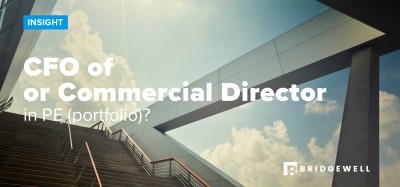CFO or Commercial Director in PE (portfolio)?
25 june 2025

Who Adds More Value in a PE Portfolio Company: The CFO or the Commercial Director? In private equity, everything revolves around value creation. Every decision, every initiative, every leadership hire is weighed against its impact on EBITDA, scalability, and exit potential.
Two roles often take center stage: the Chief Financial Officer (CFO) and the Commercial Director. Both are expected to contribute strategically, both are critical to success. But who adds more value? The honest answer: it depends. But by exploring the distinct contributions, timing, and impact of both roles, we can better understand when – and why – each makes the greatest difference.
The CFO: Financial Grip, Strategic Control, and Exit Readiness
In many PE-backed companies, the CFO is the first strategic hire post-acquisition. That’s no coincidence. Investors need clarity, speed, and control. A seasoned CFO brings:
- Immediate insight into cash flow, margins, and working capital
- Data-driven dashboards and KPIs that link operations to outcomes
- Professional reporting and forecasting, enabling board-level oversight
- Control over debt, covenants, and capital allocation, especially in leveraged structures
A strong CFO professionalizes the company’s foundation. In many cases, finance was underdeveloped pre-deal. The CFO installs the structure and discipline needed for reliable decision-making and confident board reporting. Equally important: a strong CFO lays the groundwork for exit readiness. Clean numbers, transparent forecasting, and credible financial narratives are often decisive factors in achieving a successful multiple.
The Commercial Director: Revenue Acceleration and Growth Story
Where the CFO brings control, the Commercial Director delivers momentum. Growth is often the core narrative in PE — whether organic, through pricing optimization, or via market expansion. The Commercial Director adds value by:
- Driving top-line growth via sales enablement, channel strategy, and go-to-market execution
- Increasing customer lifetime value and retention
- Owning the pricing strategy, often a direct lever on EBITDA
- Building scalable commercial teams, guided by structure and KPIs
In buy-and-build scenarios, they are critical in commercial integration across acquisitions. In other contexts, their focus may be on upgrading the sales engine from founder-led or ad hoc to a professional, data-driven operation. The challenge? Their impact is often harder to quantify precisely. But when it works, the effect on valuation is immediate and compelling.
When to Prioritize Whom? The Art of Timing and Phasing
Who adds more value depends largely on the stage of the business:
- In the first 6–12 months post-acquisition, when visibility and control are limited, the CFO is often mission-critical. Without reliable numbers, everything else is guesswork.
- During scale-up phases, when the company runs but growth lags, the Commercial Director can unlock real acceleration.
- In carve-outs or restructuring, the CFO often plays the stabilizing force — building trust, compliance, and financial clarity.
- In buy-and-build strategies, both roles are indispensable: the CFO ensures control and synergy, the Commercial Director drives unified commercial growth.
The Real Answer: Complementary Leadership at the Top
The truth is, value creation peaks when the CFO and Commercial Director complement each other. Growth without control is risky. Control without growth leads to stagnation. The goal is not to pick one over the other, but to build a leadership team where finance and commerce work in lockstep. Chemistry matters. A CFO who understands market dynamics and a Commercial Director who respects financial discipline create a high-performance, low-friction environment. That’s when portfolio companies outperform.
Conclusion
The question shouldn’t be who adds more value, but rather: what does the company need most right now to unlock value, reduce risk, and accelerate toward a successful exit? The smartest investors don’t look for either-or solutions. They understand what the business needs, when it needs it — and invest accordingly.
Not just in strong individuals, but in strong combinations. Because in a high-value exit, finance and commercial excellence are not separate tracks. They’re a single, integrated value creation engine.
